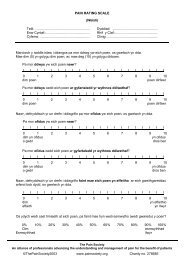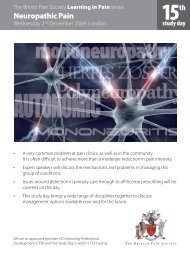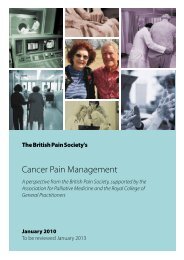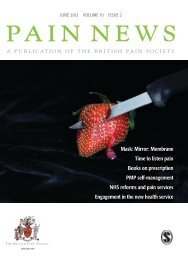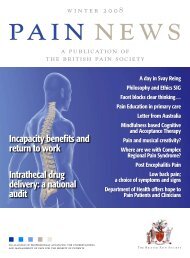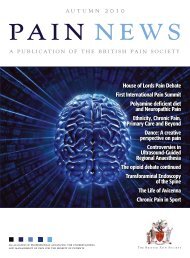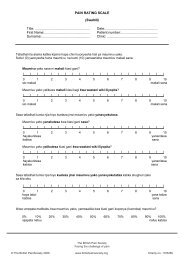Summer 2010 - The British Pain Society
Summer 2010 - The British Pain Society
Summer 2010 - The British Pain Society
You also want an ePaper? Increase the reach of your titles
YUMPU automatically turns print PDFs into web optimized ePapers that Google loves.
the possession of narcotics. She<br />
pleaded guilty and was sentenced<br />
to Alderson Federal Prison Camp<br />
in West Virginia. Her New York City<br />
Cabaret card was evoked which<br />
prevented her from working in<br />
the clubs for the next 12 years.<br />
Holiday latterly deeply regretted<br />
her addiction. She is quoted as<br />
saying,<br />
“Dope (Heroin) never helped<br />
anybody sing better or play music<br />
better or do anything better.<br />
All dope can do for you is kill<br />
you- and kill you the long, slow,<br />
hard way”<br />
“If you think dope is for kicks and<br />
thrills you are out of your mind.<br />
<strong>The</strong>re are more kicks and thrills to<br />
be had in a good case of paralytic<br />
polio or by living in an iron lung”<br />
She was unable to kick the habit.<br />
Later in her career her voice began<br />
to deteriorate under the strain<br />
of smoking, heroin and alcohol<br />
abuse. On 31st May 1959, she was<br />
taken to metropolitan hospital.<br />
Police officers arrested her for<br />
possession of heroin and searched<br />
her room. She remained here until<br />
her death on July 17th 1959, aged<br />
44, from cirrhosis of the liver.<br />
Gilbert Millstein of the New York<br />
Times described her death in the<br />
1961 sleeve notes, “in the room<br />
from which a police guard had<br />
been removed- by court orderonly<br />
a few hours before her death,<br />
which, like her life was disorderly<br />
and pitiful. She had been strikingly<br />
beautiful, but she was wasted<br />
physically to a small, grotesque<br />
caricature of herself. <strong>The</strong> worms<br />
of every kind of excess- drugs<br />
were only one- had eaten her. “<br />
Miles Davis (1926-1991)<br />
Miles Davis was an infamous<br />
trumpeter, band leader and<br />
composer. Davis started using<br />
heroin around 1950. He became<br />
depressed after his relationship<br />
to French actress Juliette Greco<br />
ended. This combined with a lack<br />
of appreciation from the critics<br />
and the fact that many of his<br />
contemporaries were using drugs<br />
led Davis to start taking heroin.<br />
At first he snorted it and then<br />
went on to using it intravenously.<br />
Davis was from an affluent family<br />
and did not seem to have social<br />
problems like Parker and Holiday.<br />
In 1953 his drug addiction was<br />
affecting his performances. Heroin<br />
had also killed two of his close<br />
friends Navarro and Webster. He<br />
eventually managed to kick the<br />
habit after returning to his father’s<br />
house in St Louis. After this he<br />
would spend time in towns like<br />
Detroit where he knew heroin was<br />
difficult to obtain. Davis’s addiction<br />
to heroin is unique in that it only<br />
lasted 4-5yrs. Davis never returned<br />
to heroin but it is reported that in<br />
his latter career he was addicted to<br />
other drugs, mostly cocaine. He<br />
finally managed to kick his cocaine<br />
habit in 1979 after he rekindled<br />
his relationship with actress Cicely<br />
Tyson.<br />
Davis died age 65 in 1991 from a<br />
stroke and pneumonia.<br />
Conclusion<br />
Jazz musicians of this time had<br />
many reasons for turning to<br />
heroin. Whether they used it<br />
to escape from troubled social<br />
circumstances, to cope with a<br />
disapproving society, to provide<br />
them with a “high” or in the<br />
mistaken belief that it would<br />
increase their creativity, most<br />
deeply regretted their addiction.<br />
particularly during the creative<br />
period from 1940-1960, substance<br />
abuse did more harm than good,<br />
and rather than being the road to<br />
creative genius, it was the pathway<br />
to premature death.”<br />
References<br />
Tolson,G.H. and Cuyjet M.J. (2007)<br />
jazz and substance abuse: Road<br />
to creative genius or pathway to<br />
premature death. International<br />
Journal of law and Psychiatry,<br />
30,530-538<br />
http://www.time.com/time/<br />
magazine/article/0,9171,826388,00.<br />
html<br />
http://everything2.com/title/<br />
Drugs+in+Jazz<br />
http://everything2.com/title/<br />
Heroin+and+jazz<br />
www.bps-research-digest.blogspot.<br />
com/2008/01/would-jazz-greatshave-been-so-great.htm<br />
Tolson and Cuyjet summarized the<br />
lives of these addicted artists in<br />
their 2007 paper,” the untapped<br />
potential that was languished on<br />
drugs and alcohol by these artists<br />
shall never be fully revealed.”” <strong>The</strong><br />
reality is [that] for most jazz artists,<br />
en.wikipedia.org/wiki/<br />
Charlie_Parker<br />
en.wikipedia.org/wiki/<br />
Billie_Holiday<br />
en.wikipedia.org/wiki/Miles_Davis<br />
PAI N N E W S S U M M E R <strong>2010</strong> 53




